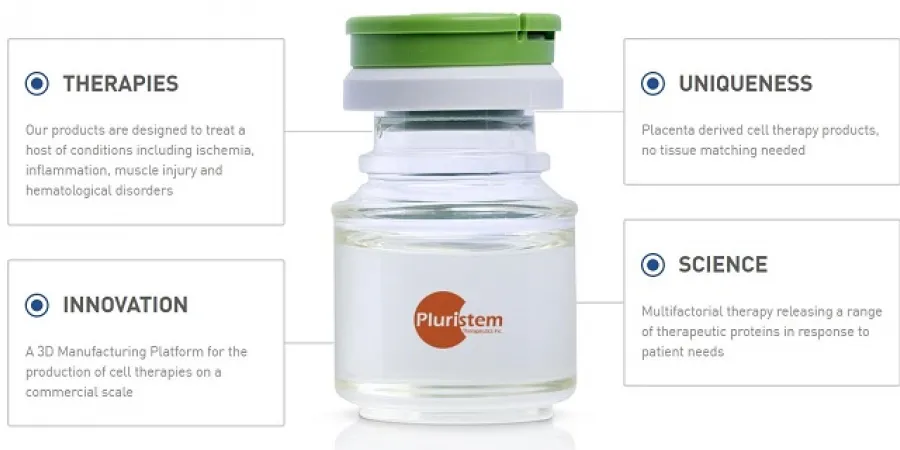Israel’s Pluristem to Collaborate with US DoD on Treatment for Mustard Gas Injuries
IsraelDefense
| 20/06/2018
Pluristem Therapeutics, an Israel-based developer of placenta-based cell therapy products, announced it has entered into a collaboration agreement with the US Department of Defense (DOD) and its United States Army Medical Research Institute of Chemical Defense (USAMRICD) to study the Company’s PLX-R18 cell therapy product in the treatment of long-term lung injuries following exposure to mustard gas. These studies will be funded by the US National Institutes of Health (NIH) and mark the second project selected by the DOD for PLX-R18. The DOD is also studying the effectiveness of PLX-R18 as a novel medical countermeasure for Acute Radiation Syndrome (ARS) prior to exposure to high levels of radiation, designed to support the needs of the US Armed Forces. These two DOD projects are in addition to the NIH-funded late-stage development of PLX-R18 to treat the injuries from acute exposure to high levels of radiation.
Sulfur mustard, also known as mustard gas, is a chemical warfare agent, causing severe chemical burns in multiple organs and can also lead to long-term damage to the lungs. Currently, supportive care is the only treatment available for people exposed to mustard gas, and there is no antidote available.
In multiple studies conducted by several agencies, including the NIH, PLX-R18 has been shown to be effective in recovering the bone marrow, leading to regeneration of progenitor cells and the three blood lineages, including white blood cells, red blood cells, and platelets. According to the company, these data, together with the results from additional studies conducted with PLX-R18 on lung fibrosis, demonstrate the cells’ potential to counteract injuries from sulfur mustard gas.
“Mustard gas injuries have both acute and long-term consequences. We believe that PLX-R18 has the potential to alleviate or prevent the devastating effects of both the acute and chronic injuries following mustard gas exposure,” said Pluristem Co-CEO and President, Yaky Yanay. “Mustard gas is also known as a radio-mimetic agent, with injuries similar to those appearing following exposure to ionizing radiation. Following the positive results with PLX-R18 in ARS, we believe that the cells have the potential to mitigate the deleterious effects of mustard gas. Positive results from these studies may establish PLX-R18 as a medical countermeasure against a wide range of chemical, biological, radiological and nuclear (CBRN) threat agents.”
Pluristem Therapeutics, an Israel-based developer of placenta-based cell therapy products, announced it has entered into a collaboration agreement with the US Department of Defense (DOD) and its United States Army Medical Research Institute of Chemical Defense (USAMRICD) to study the Company’s PLX-R18 cell therapy product in the treatment of long-term lung injuries following exposure to mustard gas. These studies will be funded by the US National Institutes of Health (NIH) and mark the second project selected by the DOD for PLX-R18. The DOD is also studying the effectiveness of PLX-R18 as a novel medical countermeasure for Acute Radiation Syndrome (ARS) prior to exposure to high levels of radiation, designed to support the needs of the US Armed Forces. These two DOD projects are in addition to the NIH-funded late-stage development of PLX-R18 to treat the injuries from acute exposure to high levels of radiation.
Sulfur mustard, also known as mustard gas, is a chemical warfare agent, causing severe chemical burns in multiple organs and can also lead to long-term damage to the lungs. Currently, supportive care is the only treatment available for people exposed to mustard gas, and there is no antidote available.
In multiple studies conducted by several agencies, including the NIH, PLX-R18 has been shown to be effective in recovering the bone marrow, leading to regeneration of progenitor cells and the three blood lineages, including white blood cells, red blood cells, and platelets. According to the company, these data, together with the results from additional studies conducted with PLX-R18 on lung fibrosis, demonstrate the cells’ potential to counteract injuries from sulfur mustard gas.
“Mustard gas injuries have both acute and long-term consequences. We believe that PLX-R18 has the potential to alleviate or prevent the devastating effects of both the acute and chronic injuries following mustard gas exposure,” said Pluristem Co-CEO and President, Yaky Yanay. “Mustard gas is also known as a radio-mimetic agent, with injuries similar to those appearing following exposure to ionizing radiation. Following the positive results with PLX-R18 in ARS, we believe that the cells have the potential to mitigate the deleterious effects of mustard gas. Positive results from these studies may establish PLX-R18 as a medical countermeasure against a wide range of chemical, biological, radiological and nuclear (CBRN) threat agents.”



